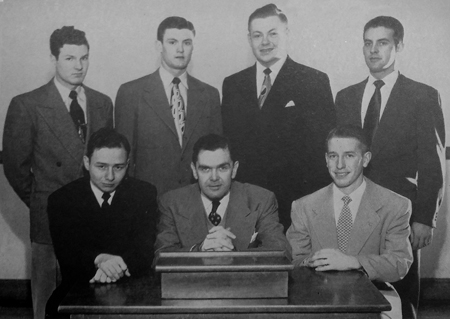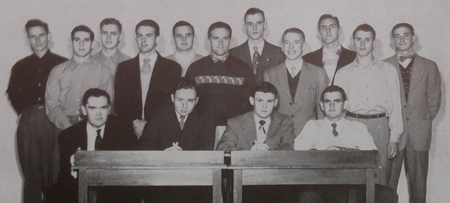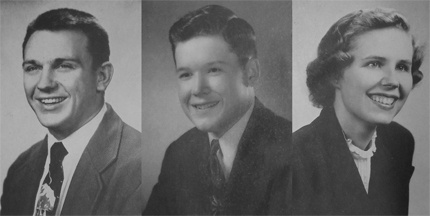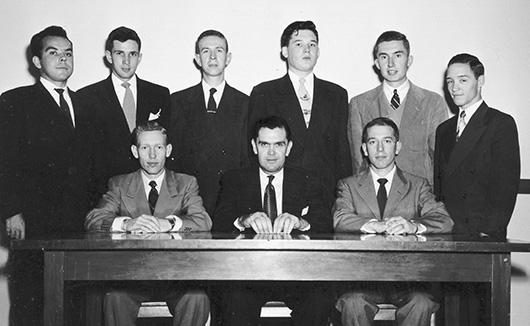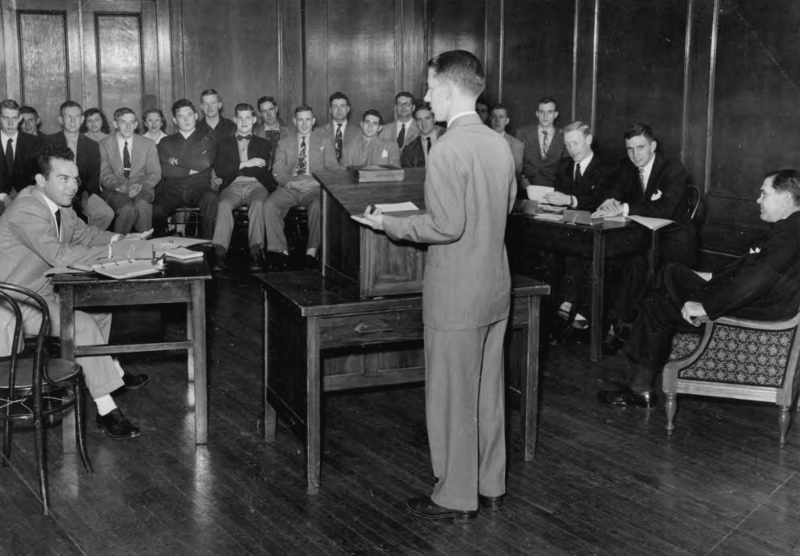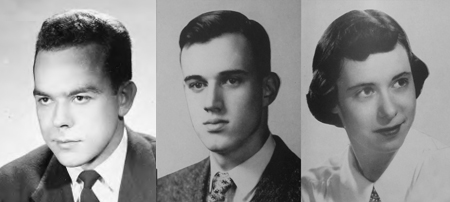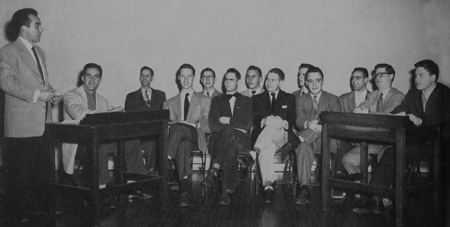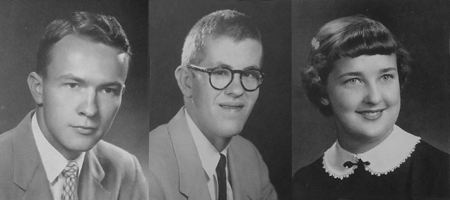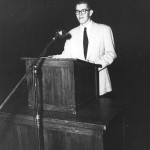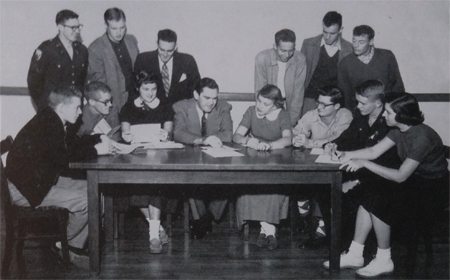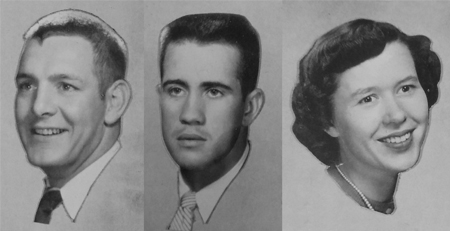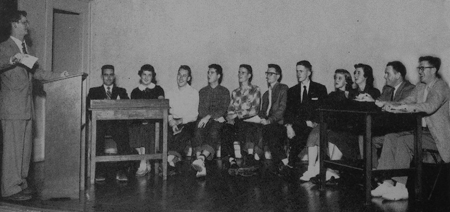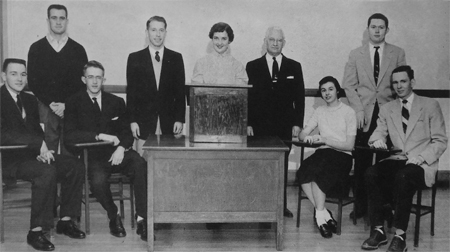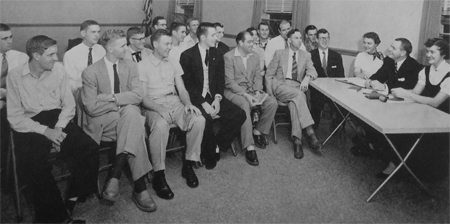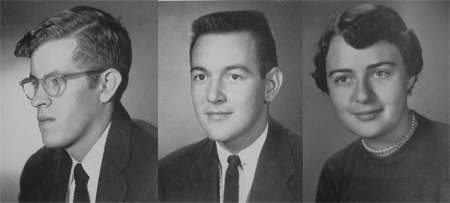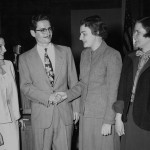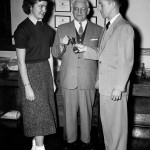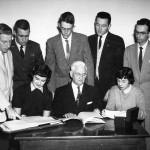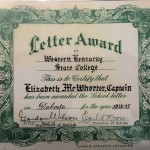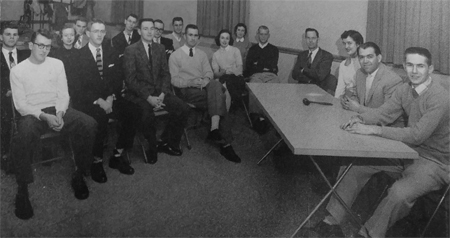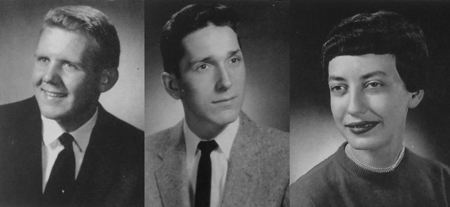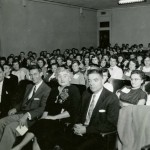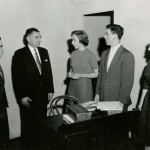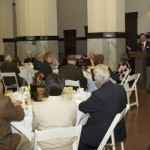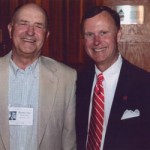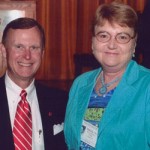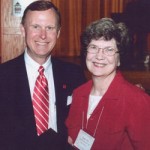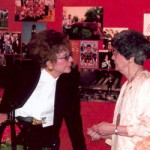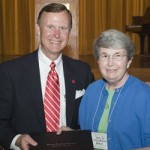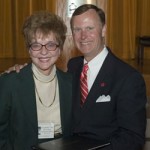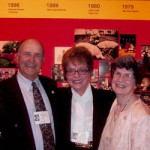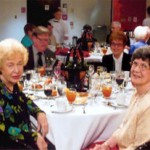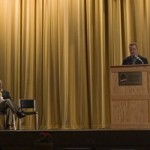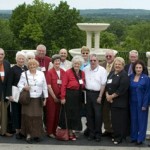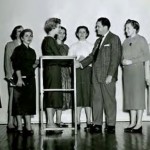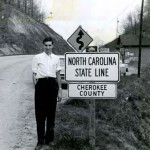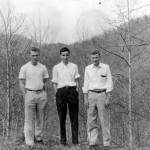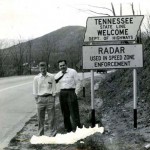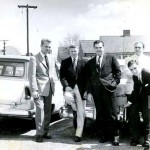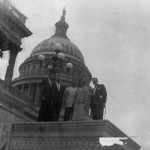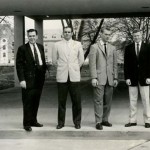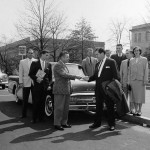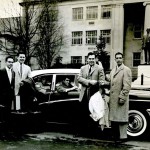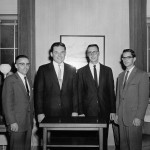< Back to Historical Archives main page
Summary of 1950 through 1959
Tremendous change and growth
The profound national social and economic changes which characterized the 1950s fundamentally marked Western's speech and debate competition culture. The change in date was not the cause, of course; it was the introduction of a new sponsor for debate at WKU: Russell Hale Miller. It seems reductionist to heap onto one person so much responsibility for change, but the sources routinely lead us to no other conclusion. Miller, a Congress Debating Club member in 1934, was hired to the English Department in 1947. By 1949 he was coordinating the university's theatrical productions, forming a debate team, and sponsoring the Congress Debating Club. Like J. Reid Sterrett before him, Miller conceived of teaching, outreach, and competition in oratory, but he went a step further and merged debate competition to forge Western's contemporary forensics model. On 24 October 1949 in room 201 of Cherry Hall, Miller began to re-create a debate team at Western.1 An 18 November 1949 College Heights Herald article described Dr. Miller as "completely reorganizing" the Congress Debating Club that he had just taken over, and planning to engage in competition which was to include impromptu and extemporaneous speaking. Described later by his students as a lonely man (unmarried) he spent his life directing theater, and driving students to compete in speech and debate.
Minority inclusion
The traditionally male Congress Debating Club offered membership to women in November 1949--the very month that Miller became sponsor--after altering their constitution. Three months later, the first women joined. They didn't stay. Women also returned to competition. A 1950 article in the WKU Herald (found in the first archive item below) claimed that this marked the beginning of competitive oratory for women at Western. That was not strictly true, considering Catherine Cannon's intercollegiate foray in 1938 and Mary Jo Hendricks in 1928, but the claim is at least very close. By 1950 the change was permanent. The American Association of University Women Oratorical Competition--hereafter the A.A.U.W.--was created the next year, 1950-51. By 1958 another oratorical competition was created for women: the Student National Education Association oratorical competition (S.N.E.A.). This brought the reorientation of the two contests, such that the AAUW competition became for only junior and senior women, and the SNEA for freshmen and sophomores. By the end of the decade, even separate divisions for men and women in intercollegiate debate--a paired event--passed into oblivion. Presumably, too many individuals were left without a partner of the qualifying sex. Late in the decade, one of Western's students had to sit out a national tournament due to the bar against mixed-gender pairings.
While great strides were made in the integration of women into speech and debate competition, Western was certainly not at the forefront of the integration of black students. In fact, Western was a full seven years behind the University of Kentucky in this, only desegregating in 1956. We are, however, proud to recognize that, one of the first two African-American students admitted to WKU, Reverend John E. Jones, can be found in these archives for 1958 and 1959. He would later go on to become the first chair of the Afro-American Studies Committee when it was established in 1972.2
Speech and debate merge
The volume of sources for this period allows us to better understand the "shape" of competition on The Hill than in previous periods. The team competed in roughly five debate tournaments each year, but this expanded significantly by 1955. Debate in a variety of formats, and occasionally also oratory, was finally met with interpretation and other speaking events by 1955 as the team ventured further abroad. It is worth noting that debate team members were routinely also active in the college's theatrical productions, as Russell Miller coordinated both activities. As for the tournaments themselves, debate competition from the early Twentieth Century through the 1950s pitted one or two pairs of students from two colleges against each other in a match. They are thus labeled as either affirmative debaters or negative debaters. As Western ventured further afield, competition at round-robin and invitational tournaments began.
Occasional debate team helper Frances Dixon described the state of oral interpretation in this period as of "very little public interest."3 She noted that coach Miller would invite both students and non-students to eat at a restaurant, and having secured a private room, had the students read at a lectern after the meal. Records of competition in the interpretation of literature first appears in 1955 at a national tournament in Virginia. The events offered were Address Reading, After Dinner, Book Review, Debate, Declamation, Dramatic Acting, Dramatic Reading, Encomium, Extempore, Informative Speech, Poetry Reading, Original Oration, Response to the Occasion, and Situation Oratory. The inclusion of both 'reading' events and 'acting' events highlights a clear delineation between performance styles of what would much later be conflated, at other tournaments, to 'interpretation' events.
This period also marks a clear beginning of regularly hosting collegiate tournaments. In November of 1973 the forensic team hosted the "23rd Kentucky Colonel Classic" tournament, suggesting that the first was either hosted during the 1950-51 school year--if retained every year--or some period shortly before then. Given that no record of competition has yet been found for the period immediately prior to 1950, we are left to conclude that Miller did indeed begin hosting collegiate tournaments as a matter of course. Given both the tremendous breadth of activity expanded into existence in 1951--noted above--and that all of this activity remains extant as of this writing--2018--Dr. Miller truly deserves this extensive written treatment.
The Russell H. Miller Archives
Dr. Miller kept an extensive series of newspaper clippings and other memorabilia, some of which are copied, thanks to the WKU Archives, immediately below. The below links offer only those albums that include clippings for oratorical competitions and debate, and the albums begin to feature significant content by the mid-1950s. Many of the historical notes above and below come from these below sources.
Frances Dixon and High School Forensics
One of Russell Miller's most constant aides in tournament hosting and judging--and possibly coaching--was Frances Dixon, a teacher of drama at College High, the training school on Western's campus. For nearly three decades she coached her own high school speech and drama team, and hosted one of the regional tournaments for the Kentucky High School Speech League.3
Annual Subsections: 1950 - 1959
1949-50
Congress Debating Club
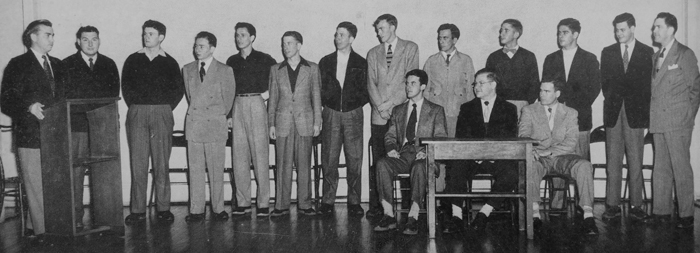 Dr. Russell H. Miller (sponsor) Charles Ball, James Chamberlain, Raymond L. Cravens,
Leonard P. Curry, Larry Dewese, Lewis Faulkner, Glenn Goff, Frank Lambreth, William
Montana, Hugh Noffsinger, Patricia Sharpe, Vincent J. Sherry, Jr., George Simpson,
Troy Spear, Thomas C. Stone, Alva Thomas, John Quentin Wesley
Dr. Russell H. Miller (sponsor) Charles Ball, James Chamberlain, Raymond L. Cravens,
Leonard P. Curry, Larry Dewese, Lewis Faulkner, Glenn Goff, Frank Lambreth, William
Montana, Hugh Noffsinger, Patricia Sharpe, Vincent J. Sherry, Jr., George Simpson,
Troy Spear, Thomas C. Stone, Alva Thomas, John Quentin Wesley
Norma Boster and Patricia Sharpe were the first women to attend meetings of the oldest club on campus, on 2 February 1950.4 Sharpe then became the first woman to join, on 14 February. This was made possible by a 21 November 1949 change to the club's constitution, offered by Alva Thomas, which opened membership to all students of Western.
Campus oratory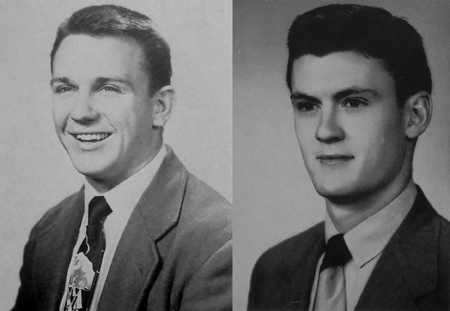 Ogden: Douglas Hensgen; Robinson: James C. Chamberlain Shortly before the preliminary Ogden Oratorical contest--required to determine finalists--Coach Miller announced that the entrants would be joined by some students from his advanced public speaking class. This included two women, Norma Boster and Mary Jane Johnson, though a newspaper article of the time claimed that these women were barred from winning.5 Johnson would later win the first AAUW oratorical contest. |
Extra photos (hover for caption, click to enlarge)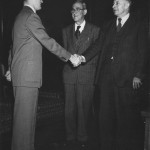 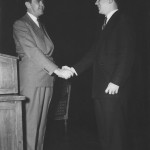 |
1950-51
Inter-collegiate Debate Team
(front, l-to-r) Leonard P. Curry (cpt), Russell H. Miller (coach), Raymond L. Cravens; (back l-to-r) Kenneth Dix, James Chamberlain, Charles Ball, George B. Simpson (sec) Russell Miller and CDC president Leonard P. Curry had been planning to create an intercollegiate competitive debate team since the start of the school year. Beginning on 12 February, Western debated several schools over the Spring semester: Georgetown College, Murray State College, and Eastern Kentucky.6 Note that the Murray debate was an exhibition.
SpeechDouglas Hensgen, three time winner of the Ogden and Robinson competitions represented Western at the Kentucky Intercollegiate Oratorical Association contest on 10 April.8 The absence of a placement record suggests he did not advance to the final round. Earlier, he represented Western at the National Campus Oratorical contest on March 24 at Bradley University.7 Again, a lack of detail suggests he did not advance to the final round. |
Congress Debating Club
Dr. Russell H. Miller (sponsor) William Bevin, James Chamberlain, Raymond L. Cravens, Gene Croft, Leonard P. Curry, Kenneth Dix, Al Green, Toby Hightower, Leo Magers, Hugh Noffsinger, Jerry Parker, Thomas Pogue, Luke Quinn, Hugh Romine, Charles Shields, Vincent Sherry, George Simpson, Robert Simpson, John Q. Wesley, Kenneth Williams
Campus oratory
Ogden: Douglas Hensgen; Robinson: Thomas Pogue; AAUW: Mary Jane Johnson The AAUW Oratorical contest had as many as, or more contestants than, the Ogden or Robinson content had had in several decades: eight students.8 Its development also returned the Ogden and Robinson to all-male again. |
1951-52
Inter-collegiate Debate Team
(front l-to-r) David E. Mefford (cpt), Dr. Russell H. Miller (coach), Raymond L. Cravens (co-cpt); (back l-to-r) William E. Bivin, George W. Woodcock Jr., David Hawkins, Thomas T. Pogue, Hamilton Alford, David Field; (not pictured) Mary Alice Hanson. Western debated Eastern KY State on 29 January and the University of Louisville on 5 and 28 February.9 The Murray State debates on 19 February and 4 March were exhibitions. At the 4 March debate, Western formed a gender-integrated affirmative team in Mary Alice Hanson and Raymond L. Cravens. |
Congress Debating Club
Dr. Russell H. Miller (sponsor); George Beard, William E. Bivin, James Bryant, Art Calhoun, Mary Alice Hanson, Raymond L. Cravens, Charles Hardcastle, David Hawkins, Sidney Kinley, Paul Keoenen, Leo Magers, David Mefford, Jerry Parker, Thomas Payne, Thomas T. Pogue, Luke Quinn, Charles Shields, Robert E. Simpson, Kenneth Webb |
Speech
William E. Bivin, pictured below, placed second at the Kentucky Intercollegiate Oratorical Association contest.10
[Link to 1952 Results Archive]
Campus oratory
Ogden: William E. Bivin; Robinson: Jerry Parker; AAUW: Joan Curry |
Extra photos (hover for caption, click to enlarge)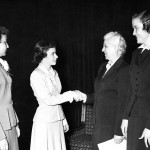 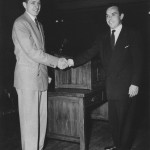 |
1952-53
Inter-collegiate Debate Team
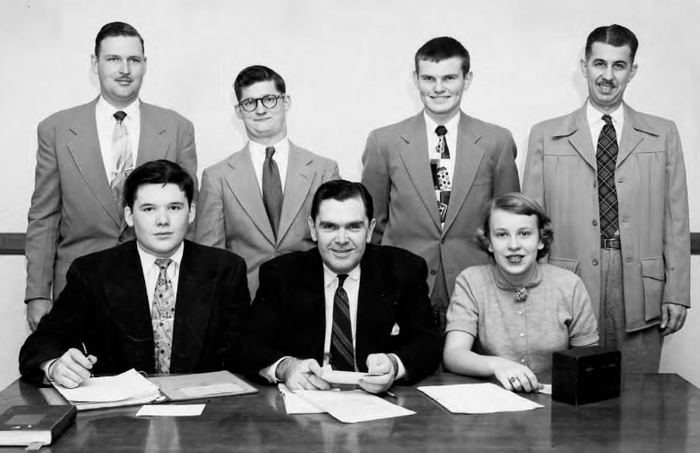 Dr. Russell H. Miller (coach); Captain: Thomas Pogue, Co-Captain: William E. Bivin,
Recorder: N.R. Naberhuis, Recorder: Catherine Hopper; also James B. Jones
Dr. Russell H. Miller (coach); Captain: Thomas Pogue, Co-Captain: William E. Bivin,
Recorder: N.R. Naberhuis, Recorder: Catherine Hopper; also James B. Jones
Western debated Murray State College in the annual exhibition early January, Centre College on 10 and 25 February and the University of Kentucky on 24 February.10 They may have also competed at the Kentucky Interscholastic Debate Tournament (state) at Eastern Kentucky State College on 17 January.
Speech
Tod Oliver and Elizabeth McWhorter represented Western at the Kentucky Intercollegiate Oratorical Association contest on 31 March.11 Oliver placed second in the men's division, and McWhorter placed fourth in the women's division.
[Link to 1953 Results Archive]
1953-54
Intercollegiate Debate Team
Dr. Russell H. Miller (coach), Raymond L. Cravens (grad asst); Harold B. Atcher, Wayne Cullen Everly, Sam Fletcher, Ronnie Holtzknecht, Catherine Hopper, Joyce Howell, Elizabeth McWhorter, Jerry Parker, Lynne Shanton, and Bill L. Short.12 Season: Murray State exhibition debates on 12 December and 14 January, Kentucky Interscholastic Debate Tournament (state) in Danville on 9 January, then hosted Centre College on 12 January.13
Campus oratory
Ogden: Walt Apperson; Robinson: Lacy Wilkins; AAUW: Martha Gray |
Congress Debating Club
Dr. Russell H. Miller (sponsor); President: James Bryant, V-P: Harold B. Atcher, Secretary: Elizabeth McWhorter; also Rita Jackson, Wayne Cullen Everly, and Maxine Watkins. A complete member list has not yet been constructed, but the competitive debate team members appear to all have been members of the CDC.
Extra photos (hover for caption, click to enlarge)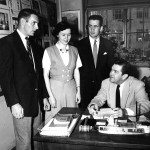 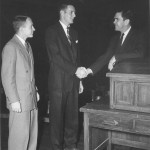 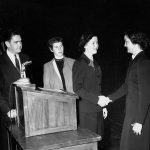 |
1954-55
Intercollegiate Debate Team
Director: Dr. Earl A. Moore; Coach: Raymond L. Cravens; Shirley Eggen, Ronnie Holtzknecht, Jeanne Jones, Elizabeth McWhorter, Jim W. Owens, Bill L. Short, and Lacy Wilkins.
Forensics1955 marks another major step for Western, as the team opted to compete at a national tournament 6-9 April, the Grand National Forensic Tournament, in Fredricksburg, VA. This brought the team to compete in both speech and debate--and other events--at a single tournament; the first such tournament in these archives. Jeanne Jones and Elizabeth McWhorter placed 5th in debate---the highest of any women's team--and Jim Owens and Bill Short placed 10th.14 It does appear that these were not separate women's and men's divisions, but an integrated open division. McWhorter also placed second in women's oratory. Both Jones and McWhorter also competed in poetry. At the Kentucky Interscholastic Debate Tournament (state) Western tied for first, after earlier hosting a debate with Harvard. This therefore marks Western's first state sweepstakes championship in debate. Coach Miller took a leave of absence this year to pursue a graduate degree, leaving Dr. Moore to sponsor in his stead. |
Congress Debating Club
Sponsor: Dr. Wilson E. Wood; President: Elizabeth McWhorter, V-P: Sterling Clark, Secretary: Wanda Kirkham, Sgt.-at-Arms: Charles Hardcastle; also Walt Apperson, Shirley Eggen, James Gabbard
Campus oratory
Ogden: Wayne Everly; Robinson: Jim Owens; AAUW: Wanda Kirkham |
Extra photos (hover for caption, click to enlarge)
1955-56
Intercollegiate Debate/Forensic Team
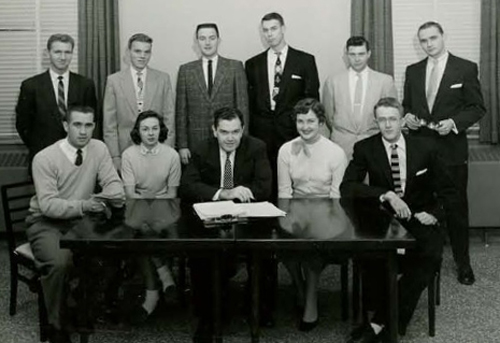 Sponsor: Russell H. Miller; Jeanne Jones, Adam P. Matheny Jr., Jim W. Owens, George
Reecer, Clyde W. Riggs, Bill L. Short, Ray B. White, Elizabeth McWhorter, and Lacy
Wilkins
Sponsor: Russell H. Miller; Jeanne Jones, Adam P. Matheny Jr., Jim W. Owens, George
Reecer, Clyde W. Riggs, Bill L. Short, Ray B. White, Elizabeth McWhorter, and Lacy
Wilkins
Expanding to two national tournaments, the team increased its ambition.15 Western also began a new format of debate: cross examination. Other formats in the past included the "Oregon style."
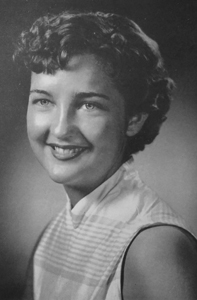 Elizabeth McWhorter won the national championship in in the women's division of Oratory at the Grand
National Forensic Tournament.16 The team of Bill Riggs and Elizabeth McWhorter also placed fifth in debate.18 The team placed second in team sweepstakes at the Kentucky Interscholastic Debate
Tournament (state) in Lexington on 3 December.15 Elizabeth McWhorter placed third. The team also competed at the 11 April Kentucky
Interscholastic Oratory Association at Berea College, but the sources are too muddled
to clarify results.17 Worth noting, the team also hosted its first non-match debate tournament--the Western
Intercollegiate Debate Tournament--on 8 December.15
Elizabeth McWhorter won the national championship in in the women's division of Oratory at the Grand
National Forensic Tournament.16 The team of Bill Riggs and Elizabeth McWhorter also placed fifth in debate.18 The team placed second in team sweepstakes at the Kentucky Interscholastic Debate
Tournament (state) in Lexington on 3 December.15 Elizabeth McWhorter placed third. The team also competed at the 11 April Kentucky
Interscholastic Oratory Association at Berea College, but the sources are too muddled
to clarify results.17 Worth noting, the team also hosted its first non-match debate tournament--the Western
Intercollegiate Debate Tournament--on 8 December.15
[Link to 1956 Results Archive]
Congress Debating Club
Sponsor: Dr. Wilson Wood; President: James Gabbard, V-P: James Maples, Secretary: Wanda Kirkham, Sgt.-at-Arms: Walter N. Scott, Parliamentarian: Elizabeth McWhorter; also Jeanne Jones, Sidney Kinley, Norman Lane, Adam P. Matheny Jr., Bill Page, John E. Schneider, Lacy Wilkins, and Jane Winchester |
Campus oratory
Ogden: James C. Embry; Robinson: Gregg O'Neil; AAUW: Nancy Hightower |
First Annual Speech and Drama Clinic (mouse-over for caption) click to enlarge
Western played host to Gifford Blyton of the University of Kentucky as part of an outreach plan to teach speech, debate, and drama. This was the first of several annual speech and drama clinics.
2006 'Class of 1956' Reunion (mouse-over for caption) click to enlarge
1956-57
Western Debate Association
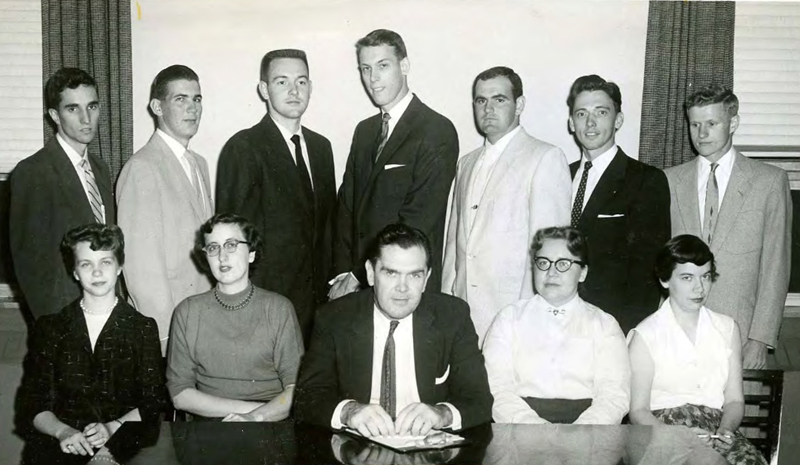 Director: Russell H. Miller; Pat Hooper, Rita Jackson, Mary Helen Jenkins, Harold
G. Meers, Jim W. Owens, Bill Pemberton, Julius Rather, Ed Render, Clyde William Riggs,
Clayton Shannon, Robert B. Siddens, Veronica Slack, Henry D. Stone, Ted Urban, Kenneth
A. Williams
Director: Russell H. Miller; Pat Hooper, Rita Jackson, Mary Helen Jenkins, Harold
G. Meers, Jim W. Owens, Bill Pemberton, Julius Rather, Ed Render, Clyde William Riggs,
Clayton Shannon, Robert B. Siddens, Veronica Slack, Henry D. Stone, Ted Urban, Kenneth
A. Williams
The team again competed in both the Grand National Forensic Tournament and the 27th Annual Southern Speech Association tournament. Mary Ruth Grise and James W. Owens each won the women's and men's divisions, respectively, of the Kentucky Intercollegiate Oratorical Association state tournament, then competed at the Interstate Oratorical Association contest.19 The silence on their results suggests they did not advance to final rounds.
[Link to 1957 Results Archive]
Tragically, team member Clyde "Bill" Riggs passed away 31 January 1957.20
Debate Travel (mouse-over for caption) click to enlarge
Congress Debating Team
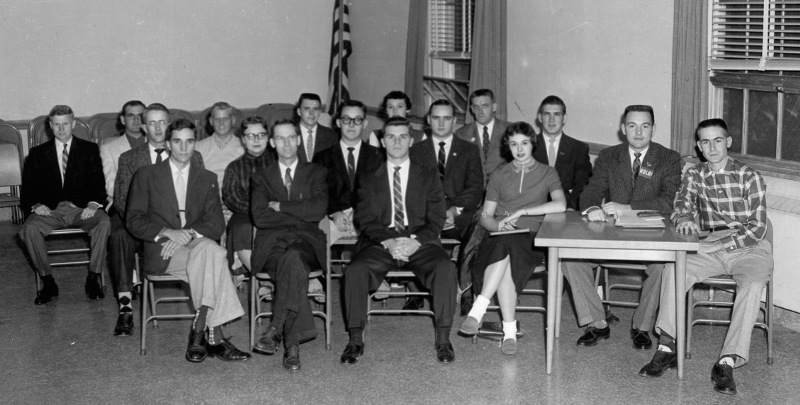
Sponsor: Dr. Willson Wood; Shirley Barnes, Pat Hooper, Jeanne Jones, James Maples, Harold Meers, Jim W. Owens, John Earl Schneider, Henry D. Stone, Neil C. Ward, Kenneth Williams
Campus oratory
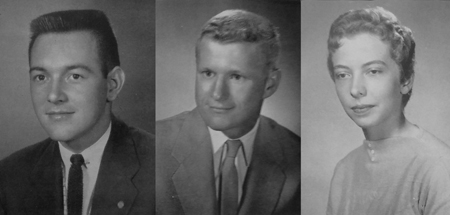
Ogden: Jim Owens; Robinson: Henry Stone; AAUW: Mary Ruth Grise
1957-58
Western Debate Association
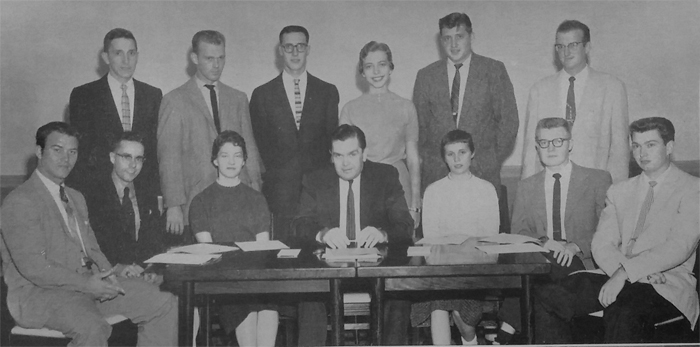 Dr. Russell H. Miller (coach); Lerond Curry, Morris Craig, Bill Francis, Linda Gass
Foote, Ray Glenn, Mary Ruth Grise, Jim Hall, Penny Hardy, Mary Helen Jenkins, Archie
Jordon, Terry Kelsay, Glenn McDonald, Bob May, Gregg O'Neil, Bill Pemberton, Thomas
T. Pogue, Freeman Powell, Leon Remington, Edwin Render, Bob W. Ritchie, and Doris
Steele
Dr. Russell H. Miller (coach); Lerond Curry, Morris Craig, Bill Francis, Linda Gass
Foote, Ray Glenn, Mary Ruth Grise, Jim Hall, Penny Hardy, Mary Helen Jenkins, Archie
Jordon, Terry Kelsay, Glenn McDonald, Bob May, Gregg O'Neil, Bill Pemberton, Thomas
T. Pogue, Freeman Powell, Leon Remington, Edwin Render, Bob W. Ritchie, and Doris
Steele
The team hosted the Kentucky Oratorical Association state tournament on 17 April, where Thomas T. Pogue won in men's oratory.21 Pogue was unfortunately barred from moving on to the Interstate Oratorical Association contest, however, as his age surpassed the age clause.23 At the 28th Annual Southern Speech Association tournament in Houston, Texas, Greg O'Neill made superior rating in debate, Ed Render made superior rating in men's interpretation of literature, and both Thomas T. Pogue and Lerond Curry made superior rating in men's oratory.
[Link to 1958 Results Archive]
Congress Debating Team
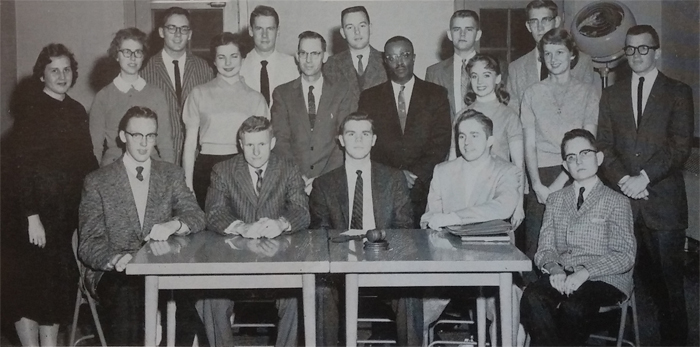 Sponsor: Dr. Willson Wood; John Earl Schneider, Henry D. Stone, Bill Pemberton, Bob
W. Ritchie, Joe Givens; also John E. Jones
Sponsor: Dr. Willson Wood; John Earl Schneider, Henry D. Stone, Bill Pemberton, Bob
W. Ritchie, Joe Givens; also John E. Jones
Included in this photo is one of Western's first two African-American students: Reverend John E. Jones, in the middle. Admitted two years earlier, he would finish in 1959 with a Masters degree in Education. He moved on to create a construction company in 1973, and at the time of the construction of this archive he was preaching at United Baptist Church in Kannapolis, North Carolina.
Campus oratory
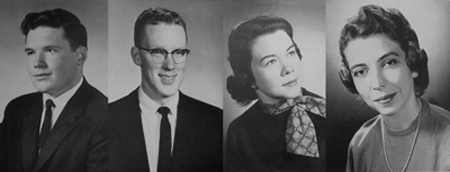
Ogden: Thomas T. Pogue; Robinson: Robert Ritchie; AAUW: Naomi Dempsey; SNEA: Mary Ruth Grise
The SNEA, along with the English Department, opted to create a fourth oratorical contest--the second for women--in order to alleviate the growing popularity of the AAUW contest.22 This brought the SNEA and the AAUW to function precisely as the Robinson and Ogden had done.
Extra photos (hover for caption, click to enlarge)
1958-59
Western Debate Association
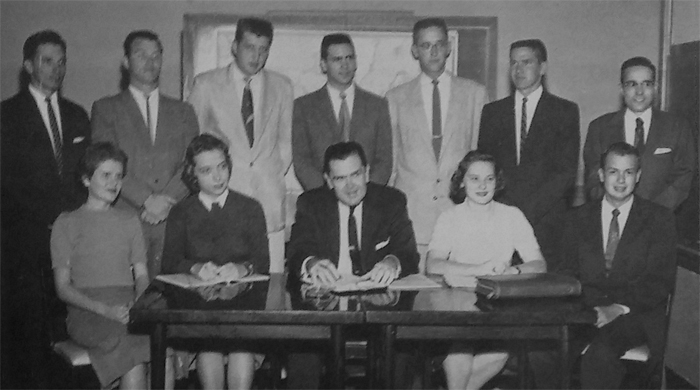 Sponsor: Russell H. Miller; Lerond Curry, Bill Francis, Linda Gass Foote, Charles
Goodall, William Greer, Mary Ruth Grise, Haywood Joiner, Bob May, Freeman Powell,
Elizabeth Rhea, Patricia Richards, Robert B. Siddens
Sponsor: Russell H. Miller; Lerond Curry, Bill Francis, Linda Gass Foote, Charles
Goodall, William Greer, Mary Ruth Grise, Haywood Joiner, Bob May, Freeman Powell,
Elizabeth Rhea, Patricia Richards, Robert B. Siddens
At the 29th Annual Southern Speech Association tournament Mary Ruth Grise received superior rating in oral interpretation.23 Others received excellent ratings in oratory and debate. Western won the Kentucky Intercollegiate Debate tournament (state) in Berea. Mary Ruth Grise made top speaker, and Lerond Curry placed second. At the Kentucky Oratorical Association tournament Lerond Curry placed second in men's oratory, and Jo Ann Hall Kurtz placed third in women's oratory.
[Link to 1959 Results Archive]
Congress Debating Team
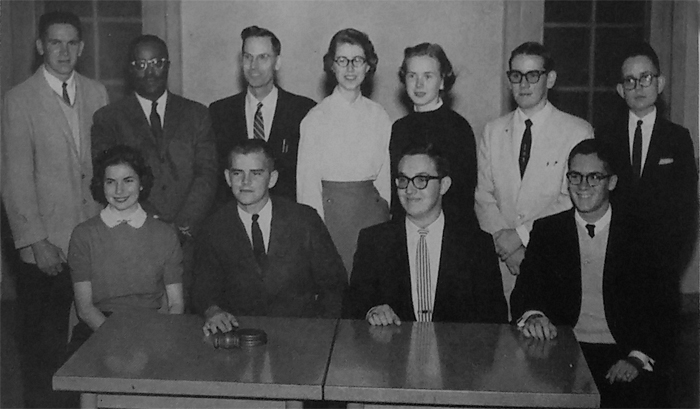 Sponsor: Dr. Willson Wood; Neil C. Ward, Lena Priestly, Beverly Belcher, Hayward
Joiner, Charles L. Wade; also John E. Jones
Sponsor: Dr. Willson Wood; Neil C. Ward, Lena Priestly, Beverly Belcher, Hayward
Joiner, Charles L. Wade; also John E. Jones
Campus oratory
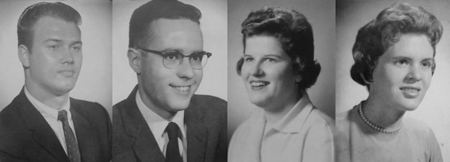
Ogden: Robert May; Robinson: Lerond Curry; AAUW: Jo Ann Hall Kurtz; SNEA: Linda Gass Foote
- WKU Student Affairs, "UA12/2/1 College Heights Herald, Vol. 26, No. 2" (1949). WKU Archives Records. Paper 4588. http://digitalcommons.wku.edu/dlsc_ua_records/4588
- http://wku.pastperfect-online.com/35749cgi/mweb.exe?request=record;id=71252089-85BC-42BB-97F3-876350726553;type=301
- Dixon wrote at the start of the 1973-74 school year an article to memorialize Dr. Miller. In so doing she claimed that the 1948 KHSSL regional tournament hosted eighty-seven participants, whereas the 1973 tournament hosted five hundred. The inconsistent language comparing a "regional festival" and a "meeting" could imply comparing not two regional tournaments but instead a regional tournament and the state tournament: "Benevolent Despot of Western Theatre." Frances Dixon. Western Alumnus, vol 42. No 6. Fall 1973, 4-6.
- WKU Student Affairs, "UA12/2/1 College Heights Herald, Vol. 26, No 7-Z245" (1950). WKU Archives Records. Paper 2823. http://digitalcommons.wku.edu/dlsc_ua_records/2823
- WKU Students Affairs, "UA12/2/1 College Heights Herald, Vol. 26, No. 11-Z245" (1950) WKU Archives Records. Paper 2827. http://digitalcommons.wku.edu/dlsc_ua_records/2827; Western Players, “UA68/17/2 Scrapbook, 1949-1950” (1950). Student Organizations. Paper 90. http://digitalcommons.wku.edu/stu_org/90, p 100.
- WKU Student Affairs, "UA12/2/1 College Heights Herald, Vol. 27, No. 8-Z245" (1951). WKU Archives Records. Paper 2842. http://digitalcommons.wku.edu/dlsc_ua_records/2842
- WKU Student Affairs, "UA12/2/1 College Heights Herald, Vol. 27, No. 11-Z245" (1951). WKU Archives Records. Paper 2839. http://digitalcommons.wku.edu/dlsc_ua_records/2839
- WKU Student Affairs, "UA12/2/1 College Heights Herald, Vol. 27, No. 12-Z245" (1951). WKU Archives Records. Paper 2838. http://digitalcommons.wku.edu/dlsc_ua_records/2838
- WKU Student Affairs, "UA12/2/1 College Heights Herald, Vol. 28, No. 7-Z245" (1952). WKU Archives Records. Paper 2856. http://digitalcommons.wku.edu/dlsc_ua_records/2856
- Lacking a contemporaneous source, the claim was relayed nearly a year later. WKU Student Affairs, "UA12/2/1 College Heights Herald, Vol. 29, No. 7-Z246" (1953). WKU Archives Records. Paper 2858. http://digitalcommons.wku.edu/dlsc_ua_records/2858; WKU Student Affairs, "UA12/2/1 College Heights Herald, Vol. 29, No. 6-Z246" (1953). WKU Archives Records. Paper 2859. http://digitalcommons.wku.edu/dlsc_ua_records/2859
- WKU Student Affairs, "UA12/2/1 College Heights Herald, Vol. 29, No. 11-Z246" (1953). WKU Archives Records. Paper 2883. http://digitalcommons.wku.edu/dlsc_ua_records/2883
- WKU Student Affairs, "UA12/2/1 College Heights Herald, Vol. 30, No. 5-Z247" (1953). WKU Archives Records. Paper 2874. http://digitalcommons.wku.edu/dlsc_ua_records/2874; Harrison, Lowell and Bennett, James, "UA68/8/2 Raymond Cravens Oral History" (1984). WKU Archives Records. Paper 1983. http://digitalcommons.wku.edu/dlsc_ua_records/1983
- WKU Student Affairs, "UA12/2/1 College Heights Herald, Vol. 30, No. 7-Z247" (1954). WKU Archives Records. Paper 2872. http://digitalcommons.wku.edu/dlsc_ua_records/2872
- Event program for 1956, relaying results for 1955: Western Players, "UA68/17/2 Scrapbook 1955-1956" (1956). Student Organizations. Paper 161. http://digitalcommons.wku.edu/stu_org/161; WKU Student Affairs, "UA12/2/1 College Heights Herald, Vol. 31, No. 5-Z247" (1954). WKU Archives Records. Paper 2917. http://digitalcommons.wku.edu/dlsc_ua_records/2917; WKU Student Affairs, "UA12/2/1 College Heights Herald, Vol. 31, No. 11-Z247" (1955). WKU Archives Records. Paper 2911. http://digitalcommons.wku.edu/dlsc_ua_records/2911; WKU Student Affairs, "UA12/2/1 College Heights Herald, Vol. 31, No. 12-Z247" (1955). WKU Archives Records. Paper 2910. http://digitalcommons.wku.edu/dlsc_ua_records/2910
- Sent two debate pairs to Grand National Forensic Tournament on 28-31 March, and two others to the 26th Annual Southern Debate Tournament in Hattiesburg, AL 2-4 April; WKU Student Affairs, "UA12/2/1 College Heights Herald, Vol. 32, No. 5-Z284" (1955). WKU Archives Records. Paper 2902. http://digitalcommons.wku.edu/dlsc_ua_records/2902
- WKU Student Affairs, "UA12/2/1 College Heights Herald, Vol. 32, No. 12-Z284" (1956). WKU Archives Records. Paper 2922. http://digitalcommons.wku.edu/dlsc_ua_records/2922
- WKU Student Affairs, "UA12/2/1 College Heights Herald, Vol. 32, No. 8-Z284" (1956). WKU Archives Records. Paper 2899. http://digitalcommons.wku.edu/dlsc_ua_records/2899; WKU Student Affairs, "UA12/2/1 College Heights Herald, Vol. 32, No. 10-Z284" (1956). WKU Archives Records. Paper 2924. http://digitalcommons.wku.edu/dlsc_ua_records/2924
- WKU Student Affairs, "UA12/2/1 College Heights Herald, Vol. 33, No. 11-Z249" (1957). WKU Archives Records. Paper 2930. http://digitalcommons.wku.edu/dlsc_ua_records/2930
- WKU Student Affairs, "UA12/2/1 College Heights Herald, Vol. 33, No. 12-Z249" (1957). WKU Archives Records. Paper 2929. http://digitalcommons.wku.edu/dlsc_ua_records/2929
- WKU Student Affairs, "UA12/2/1 College Heights Herald, Vol. 33, No. 7-Z249" (1957). WKU Archives Records. Paper 2934. http://digitalcommons.wku.edu/dlsc_ua_records/2934
- These campus oratorical contests did not divide preliminary contestants into multiple sections, necessitating upwards of a two-hour event to decide the two or three finalists per contest.
- Western Players, "UA68/17/2 Scrapbook 1957-1958" (1958). Student Organizations. Paper 181. http://digitalcommons.wku.edu/stu_org/181
- Thomas T. Pogue had been a member in 1951, '52, and '53, then returned in '58 for his senior year; Western Players, "UA68/17/2 Scrapbook, 1958-1959" (1959). Student Organizations. Paper 179. http://digitalcommons.wku.edu/stu_org/179
< Back to Historical Archives main page
Some of the links on this page may require additional software to view.


